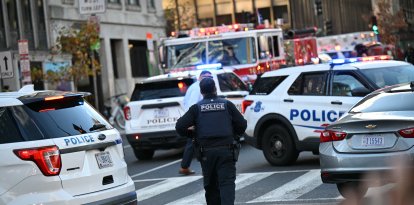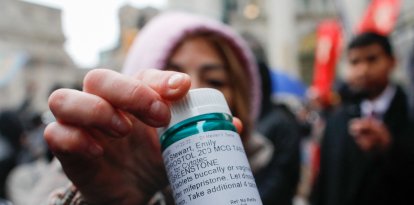Analysis
Five years later... has 'defund the police' survived?
From recruitment to the New York mayoral campaign, the movement has showed signs of resilience.

"Defund the police" in 2020.
Snow Hill, N.C., commissioners voted to disband their police department. It seems like a flashback from 2020, but it happened just weeks ago. The disbanding, its promoters assured, would save thousands of dollars for the thousands of residents of the quasi-bicentennial town. Security would be handled by the county sheriff's office.
"Don’t let your legacy be ‘I killed the Police Department’,'" "the knowledge that they are here and available is very comforting to me," neighbors could be heard saying before the vote. And also afterward, "It’s gut wrenching, It absolutely takes my breath," protested Melissa Paderick before local media. "We don’t know what kind of sheriff is going to be five years from now," whether they will honor the pledge to protect. "Everything is so unpredictable."
A wake-up call even came from Congress: "Nearly 15 years ago, the Snow Hill Police Department was formed to improve public safety, protect residents, and allow everyone to feel more secure in their homes, businesses, and neighborhoods," wrote Rep. Don Davis, a former mayor of the small town. One of the fathers, too, of his local police department. "I strongly urge town officials to reverse course."
Days later, the decision was reversed. It was enough, however, to evoke a slogan with three, four years of dust: "defund the police!" This phrase was born after the death of George Floyd in Minneapolis, Minnesota, that quickly became a favorite slogan of the 2020 street riots, along with Black Lives Matter.
"The rhetoric to 'defund the police' along with the villainization of law enforcement has slowed but its effect is profound," Sheriff John Matz told VOZ. The effect is noticeable, even to this day, in the hiring of qualified candidates, which became "extremely difficult:" "I directly attribute this to the defund the police movement." "Unfortunately, the citizens we protect are often left with inadequate service due to vacant positions."
The progressive battle cry was heard again these days also to New York. Although as a negative: socialist Zohran Mamdani, winner of the Democratic primary for mayor, repeatedly denied that he would cut the NYPD. His main contenders didn't buy his change of heart: Mayor Eric Adams, who is running as an independent, dubbed him "defund the police Mamdani." Andrew Cuomo, whom he defeated in the Democratic primary, read an old Mamdani tweet in which he claimed the New York force was "racist, anti-queer & a major threat to public safety" and asserted, "What we need is to #DefundTheNYPD."
The GOP also took the opportunity to recall his past views:
"Democrats just nominated antisemitic socialist radical Zohran Mamdani as Mayor of New York City & the new face of NY Dems. Mamdami pledged to defund the police, abolish prisons & institute socialist government grocery stores while massively raising taxes on working New Yorkers."
Like Mamdani, the Democratic Party is attempting to disassociate itself from the movement that some in its ranks promoted in streets and campaigns. Already shortly after the "defund" outbreak, polls began to reveal a growth in unpopularity: in a year from June 2020 the percentage of Americans demanding increased police spending grew by 16%, reaching 47% of the total, according to Pew Research. Hispanic adults were second only to whites as the group most supportive of that position.
An Ipsos/USA TODAY poll revealed in March 2021 that just 18% of Americans supported the movement to cut the law enforcement budget. Some 58% opposed it. Asked about "abolition," a more extreme version within the ranks of the movement, 67% opposed it.
Poll after poll shows that much of the opposition stemmed from rising insecurity in cities where governments made it public policy. Five years later, new data supports this view.
New figures against "defunding the police"
Data released this week by the Major Cities Chiefs Association, which brings together 79 U.S. and Canadian police chiefs and sheriffs, reveal that homicides continued to fall in former strongholds of the movement, which re-bolstered their police forces.

Politics
Homicides continue to decline in cities that abandoned 'defund the police' movement
Santiago Ospital
During the period of police defunding, homicides rose 44% in 70 major cities in the country. This is revealed by fresh data from the Law Enforcement Legal Defense Fund (LELDF), an organization dedicated to the legal defense of police officers. On the contrary, when police budgets were strengthened again, homicides fell 32%. Reaching levels similar to those prior to the outbreak of "defund the police," the report assures.

Society
'Re-fund the Police': Homicides plummet in cities that invest in law enforcement
Santiago Ospital


























